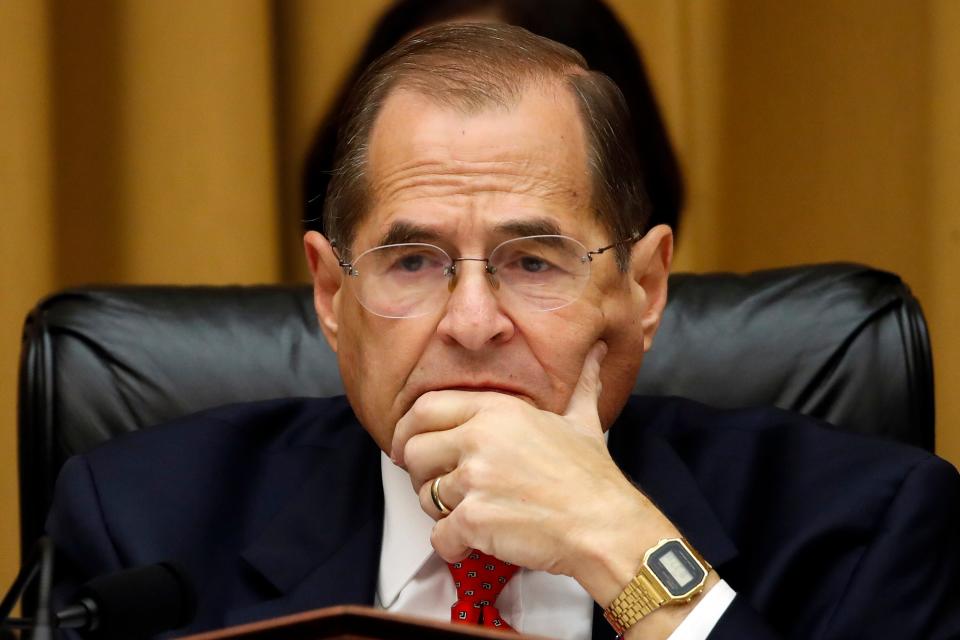Make it simple, Democrats: How to tell the Trump impeachment story and speed it up, too
A majority of House Democrats now favor an impeachment inquiry. They are responding to the unavoidable evidence of significant wrongdoing by President Donald Trump and his resistance to any oversight or accountability, and they are right. The House has taken important new steps in this direction and should continue with a full impeachment inquiry.
In court filings over the last two weeks, the House Judiciary Committee has acknowledged that it is considering articles of impeachment and needs access to the evidence collected by the special counsel and testimony by former White House counsel Don McGahn to determine “whether to recommend articles of impeachment.”
In a CNN interview Thursday, Committee Chairman Jerry Nadler characterized these filings as "formal impeachment proceedings." And they are important steps in the impeachment process. How do we get from here to a full inquiry?
Consolidate and speed impeachment
At a minimum, a single committee should assume responsibility for considering potential grounds for impeachment, consolidating the relevant evidence in a committee report, and — if that committee believes there is evidence that the president has committed high crimes and misdemeanors — reporting an impeachment resolution to the House for an up-or-down vote.

Other committees have been pursuing lines of inquiry that are relevant to potential articles of impeachment against Trump. The House Oversight Committee has held hearings investigating the president’s potential complicity in a multifaceted scheme to evade enforcement of campaign finance law and cover up those offenses. The House Ways and Means Committee invoked a rarely-used but unambiguous statute in its attempt to obtain copies of the president's taxes, which could yield evidence of the president’s violation of the Constitution’s emoluments clauses, and the committee has now been forced into court to compel the Treasury Department to comply with the law.
It's finally time:We are on the path to Trump impeachment and saving what our Founders gave us
Other House committees have begun investigating President Trump’s other potentially impeachable abuses by issuing subpoenas for evidence and testimony regarding his personal financial interests and the extent to which he has used his office to enrich himself and his family. All of these efforts have built a strong foundation for an impeachment inquiry, and all of these committees should continue robust oversight, but it is time for a single body to take charge of the impeachment case.
Americans need simplicity and clarity
There is no procedural requirement that the House explicitly delegate impeachment jurisdiction to a committee, but there are significant advantages to it doing so. The American people deserve an organized process in which it is clear what abuses of power are being investigated and what rationale is being advanced for potentially removing the president from office. The easiest way to get there is for a single committee to assume those responsibilities, either through referrals from other committees or through an explicit grant of jurisdiction from the House or the relevant committee if the inquiry is consolidated within a single subcommittee.
Stop dithering, Democrats:Impeach Donald Trump now or change the channel for good.
Starting a full impeachment inquiry will also allow the House to proceed as expeditiously as possible, and time is of the essence. Although the 17 months that are left in the 116th Congress may seem like a lot of time, President Trump has already delayed congressional efforts to hold him accountable by forcing committees to file legal actions to enforce subpoenas that are facially valid. Committing to an impeachment inquiry requires that there be time for the House to consider an impeachment resolution if a committee approves one. If that resolution were to pass the House, the Senate would then need time to try the case.
A full impeachment inquiry would also allow Congress to explain to the American people how the president’s potentially impeachable courses of conduct relate to each other. By centralizing the discussion, Congress could show that the president’s obstruction of justice, as outlined in former special counsel Robert Mueller’s testimony and report, ties in with his potentially criminal scheme to defraud campaign finance law and then cover it up while in office; and his receipt of unconstitutional profits, gains or advantages from foreign and domestic governments with direct interests in U.S. policymaking.
It is time for the House to consolidate and explicitly define the impeachment inquiry that is already under way. All of these seemingly disparate threads should be woven together to show the American people the unprecedented and potentially constitutionally repugnant abuses of power and position that this president has engaged in since he first set foot in the Oval Office.
Noah Bookbinder is the executive director of Citizens for Responsibility and Ethics in Washington. Follow him on Twitter: @NoahBookbinder
You can read diverse opinions from our Board of Contributors and other writers on the Opinion front page, on Twitter @usatodayopinion and in our daily Opinion newsletter. To respond to a column, submit a comment to letters@usatoday.com.
This article originally appeared on USA TODAY: Trump impeachment: How Democrats can explain it better, speed it up

